Srinivas Ravishankar
Adaptive recurrent vision performs zero-shot computation scaling to unseen difficulty levels
Nov 12, 2023



Abstract:Humans solving algorithmic (or) reasoning problems typically exhibit solution times that grow as a function of problem difficulty. Adaptive recurrent neural networks have been shown to exhibit this property for various language-processing tasks. However, little work has been performed to assess whether such adaptive computation can also enable vision models to extrapolate solutions beyond their training distribution's difficulty level, with prior work focusing on very simple tasks. In this study, we investigate a critical functional role of such adaptive processing using recurrent neural networks: to dynamically scale computational resources conditional on input requirements that allow for zero-shot generalization to novel difficulty levels not seen during training using two challenging visual reasoning tasks: PathFinder and Mazes. We combine convolutional recurrent neural networks (ConvRNNs) with a learnable halting mechanism based on Graves (2016). We explore various implementations of such adaptive ConvRNNs (AdRNNs) ranging from tying weights across layers to more sophisticated biologically inspired recurrent networks that possess lateral connections and gating. We show that 1) AdRNNs learn to dynamically halt processing early (or late) to solve easier (or harder) problems, 2) these RNNs zero-shot generalize to more difficult problem settings not shown during training by dynamically increasing the number of recurrent iterations at test time. Our study provides modeling evidence supporting the hypothesis that recurrent processing enables the functional advantage of adaptively allocating compute resources conditional on input requirements and hence allowing generalization to harder difficulty levels of a visual reasoning problem without training.
CBR-iKB: A Case-Based Reasoning Approach for Question Answering over Incomplete Knowledge Bases
Apr 18, 2022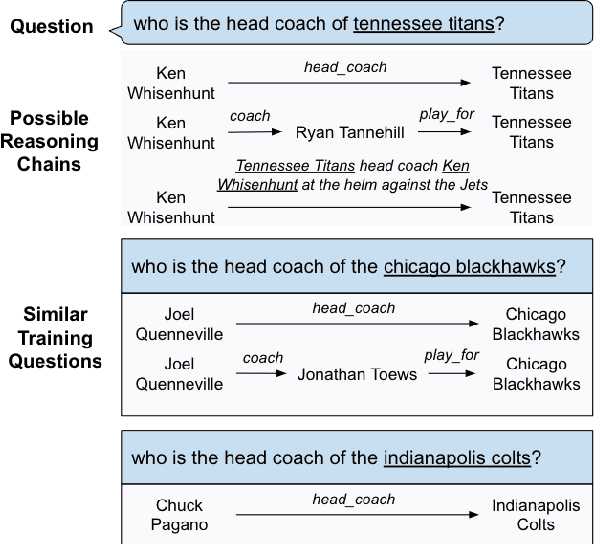

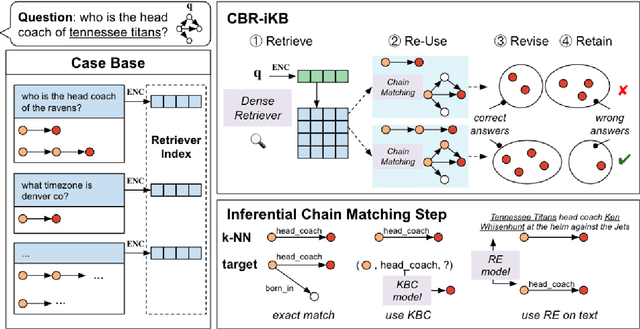

Abstract:Knowledge bases (KBs) are often incomplete and constantly changing in practice. Yet, in many question answering applications coupled with knowledge bases, the sparse nature of KBs is often overlooked. To this end, we propose a case-based reasoning approach, CBR-iKB, for knowledge base question answering (KBQA) with incomplete-KB as our main focus. Our method ensembles decisions from multiple reasoning chains with a novel nonparametric reasoning algorithm. By design, CBR-iKB can seamlessly adapt to changes in KBs without any task-specific training or fine-tuning. Our method achieves 100% accuracy on MetaQA and establishes new state-of-the-art on multiple benchmarks. For instance, CBR-iKB achieves an accuracy of 70% on WebQSP under the incomplete-KB setting, outperforming the existing state-of-the-art method by 22.3%.
A Benchmark for Generalizable and Interpretable Temporal Question Answering over Knowledge Bases
Jan 15, 2022
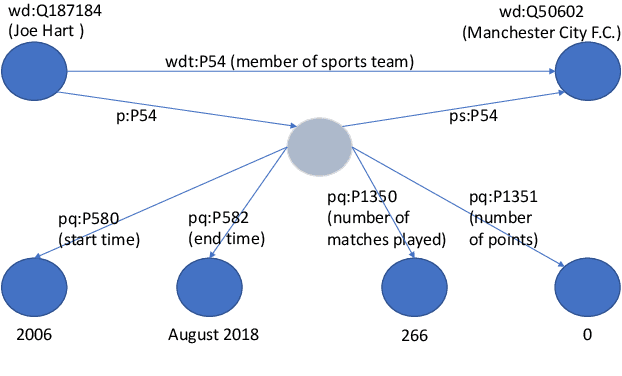


Abstract:Knowledge Base Question Answering (KBQA) tasks that involve complex reasoning are emerging as an important research direction. However, most existing KBQA datasets focus primarily on generic multi-hop reasoning over explicit facts, largely ignoring other reasoning types such as temporal, spatial, and taxonomic reasoning. In this paper, we present a benchmark dataset for temporal reasoning, TempQA-WD, to encourage research in extending the present approaches to target a more challenging set of complex reasoning tasks. Specifically, our benchmark is a temporal question answering dataset with the following advantages: (a) it is based on Wikidata, which is the most frequently curated, openly available knowledge base, (b) it includes intermediate sparql queries to facilitate the evaluation of semantic parsing based approaches for KBQA, and (c) it generalizes to multiple knowledge bases: Freebase and Wikidata. The TempQA-WD dataset is available at https://github.com/IBM/tempqa-wd.
A Two-Stage Approach towards Generalization in Knowledge Base Question Answering
Nov 17, 2021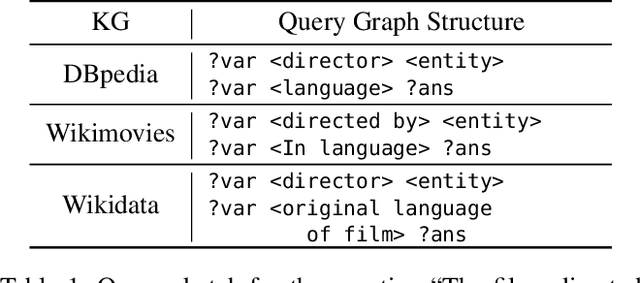
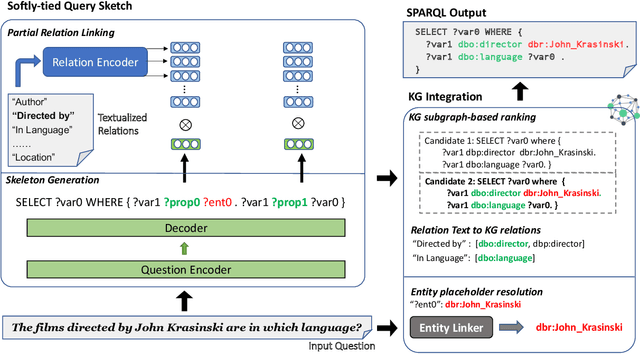

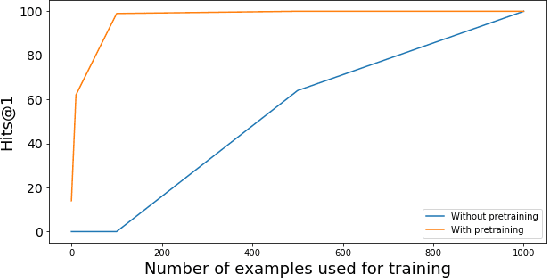
Abstract:Most existing approaches for Knowledge Base Question Answering (KBQA) focus on a specific underlying knowledge base either because of inherent assumptions in the approach, or because evaluating it on a different knowledge base requires non-trivial changes. However, many popular knowledge bases share similarities in their underlying schemas that can be leveraged to facilitate generalization across knowledge bases. To achieve this generalization, we introduce a KBQA framework based on a 2-stage architecture that explicitly separates semantic parsing from the knowledge base interaction, facilitating transfer learning across datasets and knowledge graphs. We show that pretraining on datasets with a different underlying knowledge base can nevertheless provide significant performance gains and reduce sample complexity. Our approach achieves comparable or state-of-the-art performance for LC-QuAD (DBpedia), WebQSP (Freebase), SimpleQuestions (Wikidata) and MetaQA (Wikimovies-KG).
SYGMA: System for Generalizable Modular Question Answering OverKnowledge Bases
Sep 28, 2021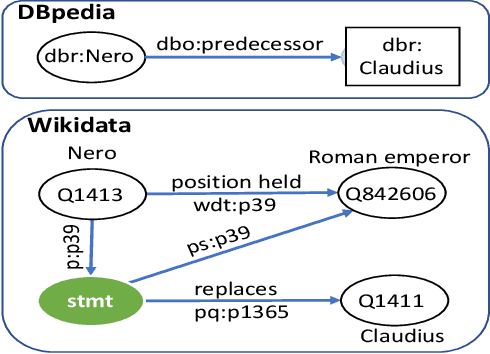
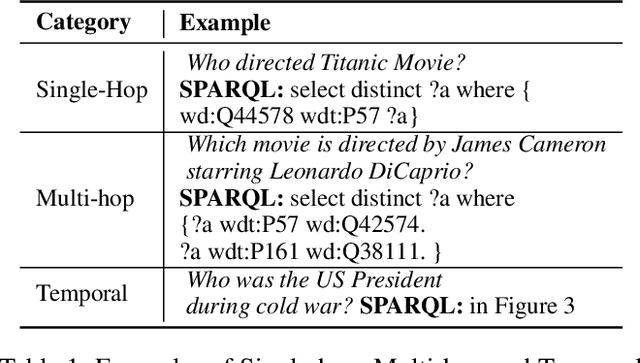


Abstract:Knowledge Base Question Answering (KBQA) tasks that in-volve complex reasoning are emerging as an important re-search direction. However, most KBQA systems struggle withgeneralizability, particularly on two dimensions: (a) acrossmultiple reasoning types where both datasets and systems haveprimarily focused on multi-hop reasoning, and (b) across mul-tiple knowledge bases, where KBQA approaches are specif-ically tuned to a single knowledge base. In this paper, wepresent SYGMA, a modular approach facilitating general-izability across multiple knowledge bases and multiple rea-soning types. Specifically, SYGMA contains three high levelmodules: 1) KB-agnostic question understanding module thatis common across KBs 2) Rules to support additional reason-ing types and 3) KB-specific question mapping and answeringmodule to address the KB-specific aspects of the answer ex-traction. We demonstrate effectiveness of our system by evalu-ating on datasets belonging to two distinct knowledge bases,DBpedia and Wikidata. In addition, to demonstrate extensi-bility to additional reasoning types we evaluate on multi-hopreasoning datasets and a new Temporal KBQA benchmarkdataset on Wikidata, namedTempQA-WD1, introduced in thispaper. We show that our generalizable approach has bettercompetetive performance on multiple datasets on DBpediaand Wikidata that requires both multi-hop and temporal rea-soning
Question Answering over Knowledge Bases by Leveraging Semantic Parsing and Neuro-Symbolic Reasoning
Dec 03, 2020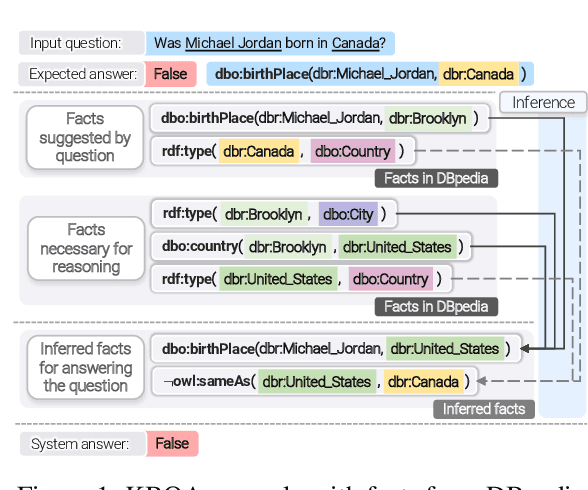
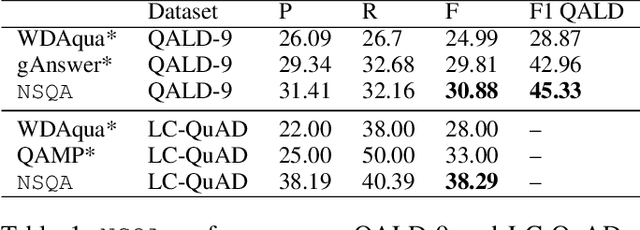
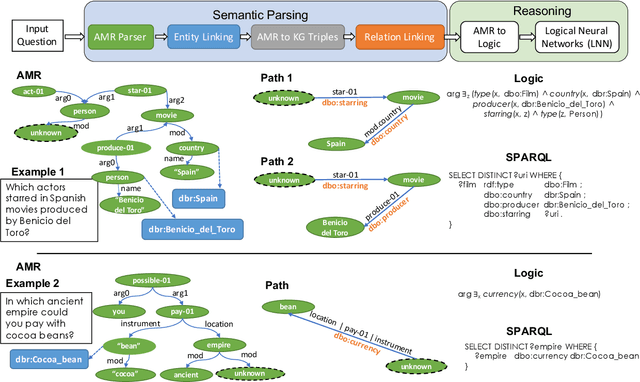

Abstract:Knowledge base question answering (KBQA) is an important task in Natural Language Processing. Existing approaches face significant challenges including complex question understanding, necessity for reasoning, and lack of large training datasets. In this work, we propose a semantic parsing and reasoning-based Neuro-Symbolic Question Answering(NSQA) system, that leverages (1) Abstract Meaning Representation (AMR) parses for task-independent question under-standing; (2) a novel path-based approach to transform AMR parses into candidate logical queries that are aligned to the KB; (3) a neuro-symbolic reasoner called Logical Neural Net-work (LNN) that executes logical queries and reasons over KB facts to provide an answer; (4) system of systems approach,which integrates multiple, reusable modules that are trained specifically for their individual tasks (e.g. semantic parsing,entity linking, and relationship linking) and do not require end-to-end training data. NSQA achieves state-of-the-art performance on QALD-9 and LC-QuAD 1.0. NSQA's novelty lies in its modular neuro-symbolic architecture and its task-general approach to interpreting natural language questions.
Leveraging Semantic Parsing for Relation Linking over Knowledge Bases
Sep 16, 2020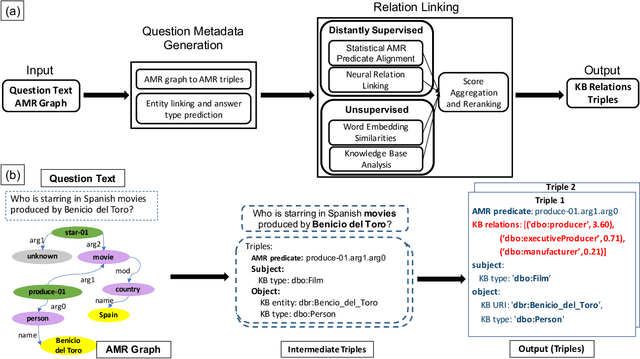
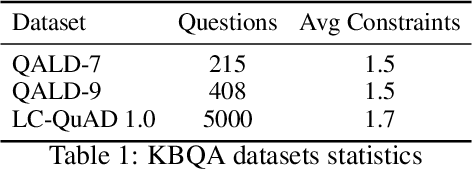
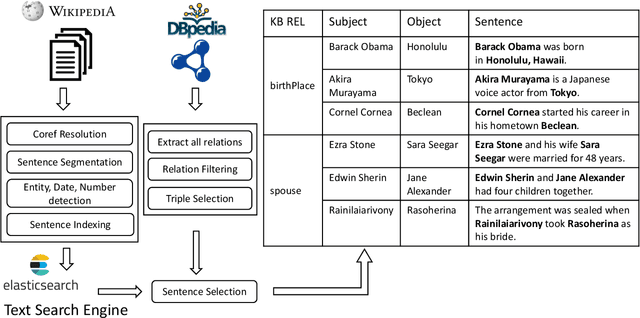

Abstract:Knowledgebase question answering systems are heavily dependent on relation extraction and linking modules. However, the task of extracting and linking relations from text to knowledgebases faces two primary challenges; the ambiguity of natural language and lack of training data. To overcome these challenges, we present SLING, a relation linking framework which leverages semantic parsing using Abstract Meaning Representation (AMR) and distant supervision. SLING integrates multiple relation linking approaches that capture complementary signals such as linguistic cues, rich semantic representation, and information from the knowledgebase. The experiments on relation linking using three KBQA datasets; QALD-7, QALD-9, and LC-QuAD 1.0 demonstrate that the proposed approach achieves state-of-the-art performance on all benchmarks.
Revisiting Simple Neural Networks for Learning Representations of Knowledge Graphs
Jan 08, 2018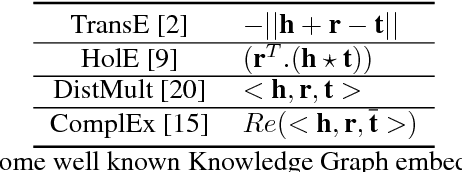
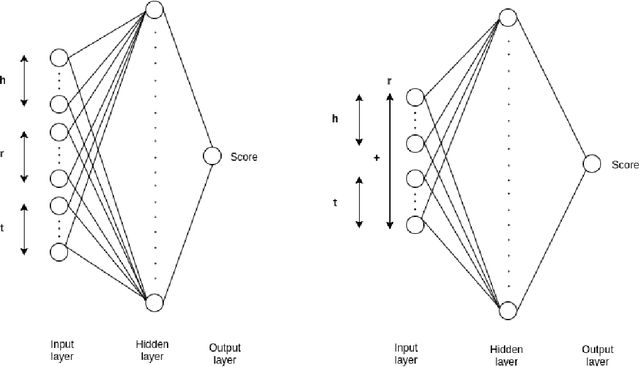


Abstract:We address the problem of learning vector representations for entities and relations in Knowledge Graphs (KGs) for Knowledge Base Completion (KBC). This problem has received significant attention in the past few years and multiple methods have been proposed. Most of the existing methods in the literature use a predefined characteristic scoring function for evaluating the correctness of KG triples. These scoring functions distinguish correct triples (high score) from incorrect ones (low score). However, their performance vary across different datasets. In this work, we demonstrate that a simple neural network based score function can consistently achieve near start-of-the-art performance on multiple datasets. We also quantitatively demonstrate biases in standard benchmark datasets, and highlight the need to perform evaluation spanning various datasets.
 Add to Chrome
Add to Chrome Add to Firefox
Add to Firefox Add to Edge
Add to Edge